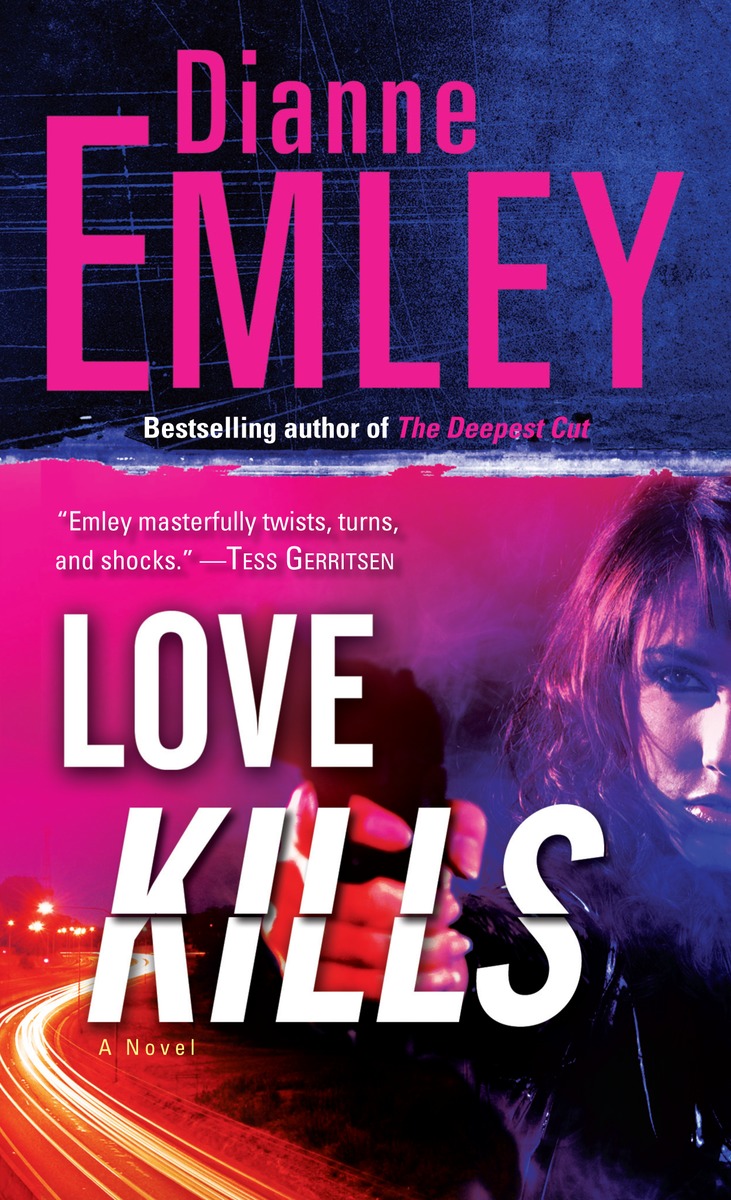Love Kills
This Book Has Limited Availability. New Editions Coming Soon!
Homicide police detective, single mother to a teenage daughter, and lover to her partner Jim Kissick, Nan Vining wishes that life was a little more serene, more like it is at Georgia Berryhill’s Malibu Canyon compound—or like it’s supposed to be there, anyway.
But three bizarre deaths have brought Vining and Kissick through the exclusive gates of this healing ground for the well-heeled. First there’s the double homicide of a celebrity private eye and his nude, drugged-out lover. Then there’s the inexplicable drowning of a Pasadena socialite. Georgia Berryhill—charismatic self-help guru to the stars—is one link to both investigations. A second link is Vining’s own mother, who was a friend to one of the victims and was being wooed by another.
Now A-listers, wannabes, lost souls, and keepers of long-hidden secrets all converge at the Berryhill compound. Some search for love and happiness, while others come for murder.
“Emley masterfully twists, turns, and shocks.”
— Tess Gerritsen
“Riveting suspense, jarring surprises and romance make this thriller a very satisfying read.”
— Night Owl Reviews
“Love Kills is a fascinating tale of love, murder… and family rivalries and loyalties… Emley writes with verve… Highly recommended.”
— I Love a Mystery Newsletter.com
“The plot moves briskly along a twisted path… Recommended for readers who like character-driven mysteries.”
— Fresh Fiction
Chapter 1
Vince Madrigal knew all about cause and effect. Many times he’d delivered the spark, then stood back to watch the fireworks with the satisfaction stemming from a job well done. He loved his work. He’d made more enemies than friends, but hate paid better than love. Several big Hollywood names would enjoy seeing him dead. The way Madrigal saw it, if those people hadn’t been doing nasty stuff that they shouldn’t have, they wouldn’t have dirty laundry to go through. In his line of work, secrets were money in the bank. A-list secrets had put his kids through private schools, paid a couple of alimonies, and footed a handsome lifestyle. He’d earned his moniker: “P.I. to the Stars.”
Both secrets and silence were commodities. This job’s client understood that ugly fact and had taken the bad news well, knowing that fame had its privileges and costs. After negotiations on that unpleasant matter, they’d quickly moved on to the next order of business: the client needing more of the rare items that Madrigal could procure. It had all been very civilized–too civilized, Madrigal thought.
It was the wee hours of the morning and raining buckets as he drove Colorado Boulevard and entered the Northeast L.A. neighborhood of Eagle Rock.
What idiot said it never rained in California?
As the windshield wipers slapped the downpour, he looked at the lonely, shiny streets of the worn-out neighborhood. He was having a dark night of the soul. He was not an introspective person, and the impulse took him unawares, like a baseball bat to the skull. It wasn’t unusual for this client to arrange meetings in out-of-the-way places to elude the paparazzi, but this early-morning rendezvous in East Jesus was making Madrigal uneasy. Rather than listening to his gut, though, he anticipated the “somthin’ somthin’” he’d been promised.
“I know what you like,” the client had said with a snigger.
Madrigal gave his stock response, “You know what I always say, ‘Faster horses, older whiskey, and younger women.’” And they’d laughed like old friends who well understood each other.
He wheeled his Midas gold Ford F-150 pickup through the deserted streets. The truck was the same color as his pristine 1975 Cadillac Eldorado in his garage at home—the car Elvis had given him. One of the few tall tales about him that happened to be true. Madrigal had done security work and a bit more for the King back in the day.
Spotting a road sign that announced that he was driving historic Route 66 prompted him to begin singing tunelessly to the old song about getting your kicks. He couldn’t remember all the cities in the lyrics, so he improvised, his baritone scoured by decades of cigarettes and booze.
“Barstow, Nipomo, San Bernardino…”
He saw the motel’s neon sign: HiWay Haven. Some of the letters were sputtering. Of course, he thought. The dump came into view and then blurred as the wipers batted the rain. Attached above the original neon sign was a 1980s-era back-lit plastic one that boasted: “Free Cable TV.”
“Don’t forget Winona, by way of Pomona.”
The truck idled in the deserted street as he checked out the place. The single-story motel had twenty rooms flanking a buckled asphalt parking lot. Three cars were parked there: a battered Toyota 4Runner with Mexican plates, a Nissan Maxima with California plates, and a car he recognized: a new yellow Volkswagen Beetle. The windows in all the other rooms and in the office near the driveway were dark, but a light shone dimly through a crack in the closed drapes in the room near where the Beetle was parked.
“Trendi, my love.” Madrigal smiled. He’d coveted the willowy blonde, even though he thought the flowery tattoos across her shoulders and bosom were an insult to her beautiful skin. Was she his somthin’ somthin’? This was a treat.
Thinking about her gave him a rise in his Wranglers.
Madrigal turned into the driveway and drove past the motel office. Cardboard Easter bunnies and Easter eggs were taped inside its windows, reminding Madrigal that it was Easter morning. He reflected on his childhood in San Antonio, Texas. His mother used to wake him and his siblings before dawn to dress for the sunrise service at Victory Baptist Church.
He improvised a hymn. “Hearts to heaven and voices tuneless… Alleluia!”
Madrigal parked beside the Volkswagen in front of room seven. He took out the key his client had mailed. The plastic diamond-shaped fob had “7” stamped on it in gold paint. Seven was his lucky number.
He struggled into his sport coat with its Western-style suede trim and piping. He looked thinner with it on. He worked to keep himself fit, but a belly, though not as big as the one his dad had sported in his later years, persisted in hanging over his silver belt buckle, a large oval with USMC in raised letters.
Still humming, he took a comb from his jacket pocket and ran it through his reddish-brown hair and his walrus mustache in the visor mirror. He straightened his aviator-style glasses and put on his black suede Resistol cowboy hat, also his trademarks, as were his Tony Lama ostrich boots. He guarded his image as carefully as a corporate giant protected its brands.
Into his jacket pocket went the flask of Balvenie scotch he’d brought from home. He grabbed the items he was delivering and ran through the rain, robustly singing made-up lyrics, “All along Route Sixty-Six…”
Number 7’s door was locked. One swift kick would have been sufficient to bust it open, but he used the key.
“Ahhh…leee…luiiiaaa!”
Smelling of disinfectant and stale cigarette smoke, the darkened room’s furnishings were cheap pressboard, but everything looked cleaner than he’d expected—except for a stain on the carpet the size and shape of a watermelon. A dim light came from the bathroom, where the door was half-closed. The rest of the lights were off. The room was cold.
“Well, hello, Trendi.”
She sat on the edge of the bed, holding a black cape closed over her torso with two pale hands. The cape was draped open over her bare legs up to her thighs. The hood was pulled over her hair. Her white face looked like a bright moon against the black fabric. Her legs were dropped open. He’d investigate further in a minute, but she appeared to be nude. That would explain why her teeth were chattering, but her face was shiny with perspiration.
She slid her eyes sideways to look at him and said nothing. It was hard to tell for sure in the nearly dark room, but her pupils looked dilated.
Higher than a kite, Madrigal thought. So much for the cocaine and X he’d brought.
He set the things his client wanted on a table beneath a window near the door. Madrigal never asked questions. He’d just opened his Rolodex—he still used one—made a few calls, and gotten the stuff: cremated human remains and a box of Cuban cigars. He’d gotten a box of cigars for himself, while he was at it. The remains were sealed inside a gallon-sized Baggie. He’d been told to procure the remains of a lawyer, overcomplicating matters, he’d thought. He’d lie if asked. They were human, anyway.
While he was locking the door, he heard Trendi say something.
“Demon.”
“Excuse me, honey?”
Her eyes bored into him. She squeezed the cape so tightly that her hands looked translucent.
She moved her eyes to focus on his hat. “That’s a demon’s hat,” she said. “It is a demon’s hat.” Her speech was clear, but she labored to put the words together.
“It can be any kind of hat you want, doll.”
Still standing near the door, he took the flask from his pocket and set it on the table. The room was quiet except for the pounding rain on the thin roof. He sniffed the air. There was the smell of wet wool from her cape but beneath that and the disinfectant was an earthy odor he knew only too well: blood.
The girl’s teeth were chattering wildly and her hands were shaking. Then blood dripped from the hem onto her bare foot and began to ooze between her fingers.
He pulled open the cape.
She didn’t resist. He wondered if she’d forgotten he was there. She dropped her hands and fell back onto the bed.
She was nude, a knife embedded in her belly. Madrigal recognized the WWII-era KA-BAR knife he kept beneath the seat of his truck.
She mumbled incoherently. Her skin was smeared with blood.
He reached for the Smith & Wesson Chief’s Special that he always carried in a pancake holster.
The bathroom door was flung open. “Drop it, Vince.”
He recognized the voice. Also familiar was the gun pointed his way: Vince usually kept it in his Cadillac’s glove compartment. “Did you do this?” he asked, gesturing at poor Trendi.
“No, Vince. You did.”
“So this is how it ends.” A violent death was no big surprise. It was astonishing that it hadn’t happened sooner. Of course, he would have chosen a classier joint, but all in all, it was a fitting send-off.







